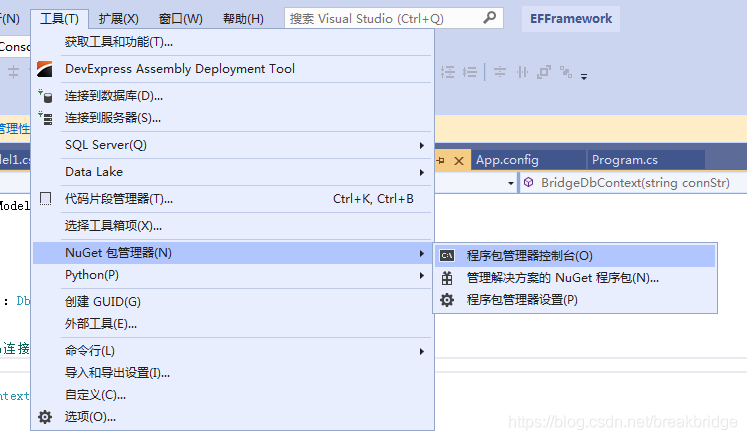C#EF的简单使用
一、获取EF
1.打开NuGet程序包管理器控制台

2.选择默认项目(要导入EF的项目),输入命令:Install-Package EntityFramework

3.若导入成功,在引用中会有以下两个引用

二、添加实体数据模型
1.添加新项,选择ADO.NET 实体数据模型

2.选择Code First(也可以选择其他两种模式DB First和Model First)

ps:三者区别,推荐博文:https://blog.csdn.net/u010191243/article/details/44755977?utm_source=copy
3.选择要建立模型的数据库,连接字符串可以选择自动生成或者手动设置

4.选择要生成模型的表和视图

5.项目中会自动生成一个派生于DbContext的文件和各个表模型类

三、生成文件的简单介绍
1.数据库表信息
1 CREATE TABLE [dbo].[T_EF] 2 ( 3 [ID] [numeric](18, 0) IDENTITY(1,1) NOT NULL primary key, 4 [Name] [nchar](10) NULL, 5 [Age] [tinyint] NULL, 6 [Location] [nchar](10) NULL 7 )
2. DbContext
1 namespace EFConsole 2 { 3 using System; 4 using System.Data.Entity; 5 using System.ComponentModel.DataAnnotations.Schema; 6 using System.Linq; 7 8 public partial class BridgeContext : DbContext 9 { 10 /// <summary> 11 /// 利用连接字符串连接数据库 12 /// </summary> 13 public BridgeContext(string connStr) : base(connStr) 14 { 15 } 16 17 /// <summary> 18 /// 利用App.config中配置的字符串连接数据库 19 /// </summary> 20 public BridgeContext() : base("name=BridgeDb") 21 { 22 } 23 24 public virtual DbSet<T_EF> T_EF { get; set; } 25 26 protected override void OnModelCreating(DbModelBuilder modelBuilder) 27 { 28 modelBuilder.Entity<T_EF>() 29 .Property(e => e.ID) 30 .HasPrecision(18, 0); 31 32 modelBuilder.Entity<T_EF>() 33 .Property(e => e.Name) 34 .IsFixedLength(); 35 36 modelBuilder.Entity<T_EF>() 37 .Property(e => e.Location) 38 .IsFixedLength(); 39 } 40 } 41 }
3.App.config文件
1 <?xml version="1.0" encoding="utf-8"?> 2 <configuration> 3 <configSections> 4 <!-- For more information on Entity Framework configuration, visit http://go.microsoft.com/fwlink/?LinkID=237468 --> 5 <section name="entityFramework" type="System.Data.Entity.Internal.ConfigFile.EntityFrameworkSection, EntityFramework, Version=6.0.0.0, Culture=neutral, PublicKeyToken=b77a5c561934e089" requirePermission="false" /> 6 </configSections> 7 <connectionStrings> 8 <!--选择生成带密码时的连接字符串--> 9 <add name="BridgeDb" connectionString="Server=.;Initial Catalog=Bridge;User ID=sa;Password=123" providerName="System.Data.SqlClient" /> 10 <!--选择生成不带密码时的连接字符串--> 11 <add name="BridgeContext" connectionString="data source=PC-20181123XOVS\BRIDGE;initial catalog=Bridge;persist security info=True;user id=sa;MultipleActiveResultSets=True;App=EntityFramework" providerName="System.Data.SqlClient" /> 12 </connectionStrings> 13 <startup> 14 <supportedRuntime version="v4.0" sku=".NETFramework,Version=v4.7.2" /> 15 </startup> 16 <entityFramework> 17 <providers> 18 <provider invariantName="System.Data.SqlClient" type="System.Data.Entity.SqlServer.SqlProviderServices, EntityFramework.SqlServer" /> 19 </providers> 20 </entityFramework> 21 </configuration>
4.表文件
1 namespace EFConsole 2 { 3 using System; 4 using System.Collections.Generic; 5 using System.ComponentModel.DataAnnotations; 6 using System.ComponentModel.DataAnnotations.Schema; 7 using System.Data.Entity.Spatial; 8 9 /// <summary> 10 /// 指定表名 11 /// </summary> 12 [Table("T_EF")] 13 public class T_EF 14 { 15 /// <summary> 16 /// [主键(每个表必须要有主键),表示是自增列] 17 /// </summary> 18 [Key, DatabaseGenerated(DatabaseGeneratedOption.Identity)] 19 public decimal ID { get; set; } 20 21 /// <summary> 22 /// [指定对应的列名,限定列的字符长度] 23 /// </summary> 24 [Column("Name"), StringLength(10)] 25 public string Name { get; set; } 26 27 /// <summary> 28 /// 可空类型指定 29 /// </summary> 30 public byte? Age { get; set; } 31 32 [StringLength(10)] 33 public string Location { get; set; } 34 } 35 }
四、对数据库的增删改查
1.增
1 using (var bridgeContext = new BridgeContext()) 2 { 3 //添加一个对象 4 T_EF t_EF = bridgeContext.T_EF.Add(new T_EF() { Name = "RB" }); 5 //将修改后的保存到数据库 6 bridgeContext.SaveChanges(); 7 }
2.查
//根据主键查询
T_EF t_EF1 = bridgeContext.T_EF.Find(1);
//根据TSQL查询
DbSqlQuery<T_EF> dbSqlQuery = bridgeContext.T_EF.SqlQuery("select * from [T_EF] where [ID] = {0}", 2);
3.改
//修改数据,需先查出实体,再修改保存 T_EF t_EF1 = bridgeContext.T_EF.Find(1); t_EF1.Location = "GD"; bridgeContext.SaveChanges();
4.删
//删除数据也需先查出后删除再保存
DbSqlQuery<T_EF> dbSqlQuery = bridgeContext.T_EF.SqlQuery("select * from [T_EF] where [ID] = {0}", 2);
bridgeContext.T_EF.RemoveRange(dbSqlQuery);
bridgeContext.SaveChanges();




 浙公网安备 33010602011771号
浙公网安备 33010602011771号